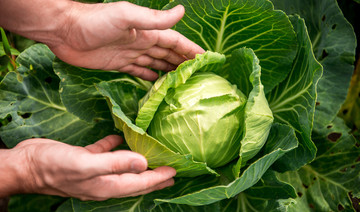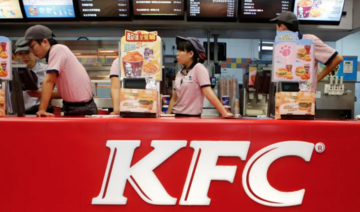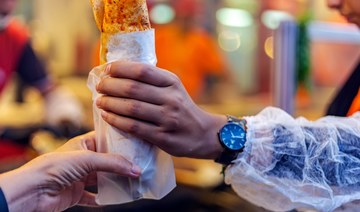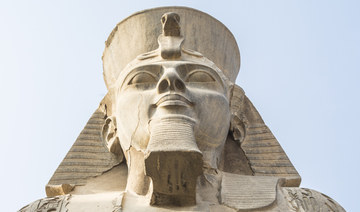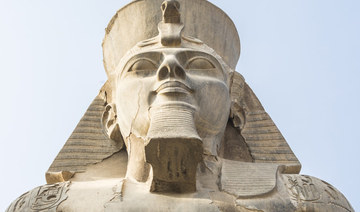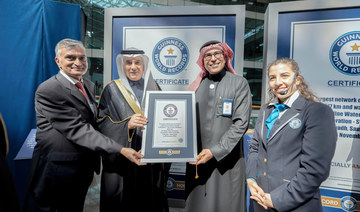PARIS: From a container wafts the sweetly pungent odor of coffee grounds which, far from being discarded as waste, are being lucratively recycled to produce oyster mushrooms.
Grounds, which Parisian brasseries throw out daily by the ton, are perfect for the job, and a snapshot of a fast-growing urban agricultural trend.
The mulch of grounds is mixed with cardboard and wood chips and shoved into lengths of plastic with pieces of mushroom culture.
They are then hung vertically in a dark space and left to incubate for a fortnight.
“We are reproducing undergrowth subsoil conditions. The temperature and humidity are comparable,” explains Arnaud Ulrich, co-founder of UpCycle-La boite à champignons (mushroom box), based in the Paris suburb of Saint-Nom-la-Breteche.
Nestled away from the light, the spores of mushroom mycelium fungus — a key food source for many soil invertebrates and which can also help to clean polluted soil — rapidly spread as they would beneath the roots of a tree.
After incubation, the bags containing the grounds and spores, by now completely white, are transferred to a different room for “fructification.”
There, the lights are switched on and humidity reduced. Cuts are made in the bags, allowing the mushrooms to emerge.
“The mushrooms are ‘stressed’ — which makes them want to reproduce and free up their spores, leave the bags,” says Ulrich. “It simply remains to harvest them.”
Ulrich says urban agriculture is first and foremost about recycling organic waste from cities as a means of expanding the move toward a regenerative, ‘circular economy’ making more judicious use of finite resources.
“Thirty percent of urban waste is useful biowaste and today, only five percent of this organic matter is recycled,” he notes.
“We are just doing what they did in the 19th Century, but with modern methods,” he said.
At that time, “Paris mushrooms” were also born from the idea of recycling organic matter.
Market gardeners cultivated their produce in quarries on the perimeter of the capital making use of the droppings of the thousands of horses who helped to deliver vegetables to the market at Les Halles in central Paris.
Today, some 20 tons of coffee grounds are collected each month in and around Paris, the bulk from large firms’ restaurants in the west of the city. From that can be produced around two tons of oyster mushrooms.
At €15 ($17) per kilo that equates to a €30,000 ‘harvest’ and a campaign is under way to encourage more Parisian cafes to get in on the act.
“It’s a virtuous undertaking — we are producing between 20 and 30 kilos of grounds a week,” says Romain Vidal, 30 and the owner of Le Sully brasserie in Paris and a pioneer of the recycling technique.
“And our chef puts the oyster mushrooms on the menu for the brasserie’s customers,” he adds.
The chef concurs, saying he is “delighted,” describing the mushrooms as thick and juicy.
After every expresso, every cappuccino, Le Sully’s waiters bag the used grounds which a delivery biker from the coffee company whisks away so further use can be made of them.
Paris’s deep-rooted cafe culture means there is no shortage of the stuff — the city annually produces around 600,000 tons of grounds, according to UpCycle, which is helping manage similar projects in several other French towns.
After harvesting, the already recycled grounds embark upon their third lifespan, returning to the ground as compost — or ‘champost’, a play on words with champignon, French for mushroom — mixed in with mushroom strands and wood cellulose.
With their system up and running, Ulrich and co are branching out by installing “Rocket” compost machines in the heart of Paris’ La Defense business center.
The machines swallow up organic waste from restaurants such as peelings and leftover food waste, be it meat or fish, as well as grass cuttings.
The resulting scrunched up waste produces compost in record time ... which in turn will be utilized to spawn more Parisian mushrooms from September.
Urban farming: Parisians wake up to coffee-fueled mushroom magic
Urban farming: Parisians wake up to coffee-fueled mushroom magic
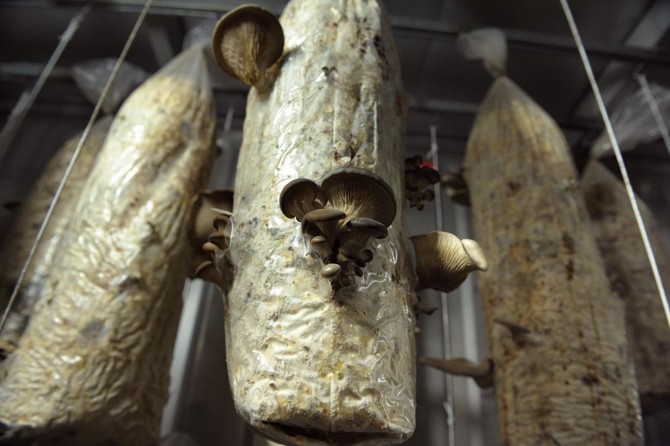
- ‘Thirty percent of urban waste is useful biowaste and today, only five percent of this organic matter is recycled’
- ‘Paris mushrooms’ were born from the idea of recycling organic matter
Algeria’s first KFC restaurant reopens without logo following Gaza protests
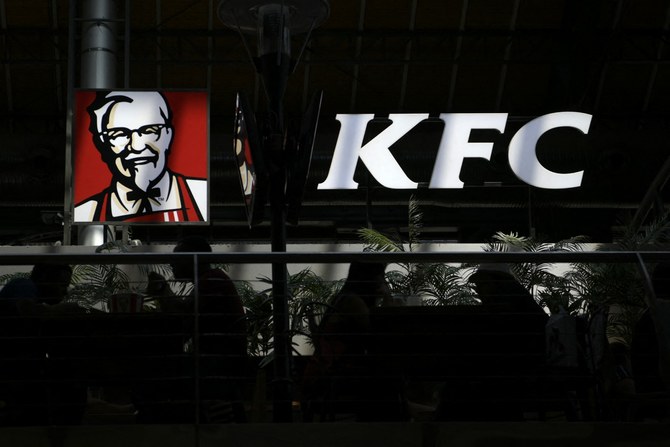
- Protesters gathered outside outlet last week in solidarity with Palestinians
- KFC parent company Yum! Brands has faced backlash for its ties with Israel
LONDON: Algeria’s first Kentucky Fried Chicken outlet has resumed operations after a temporary closure prompted by a series of pro-Palestinian demonstrations last week.
However, the restaurant, situated in the Algiers suburb of Dely Ibrahim, reopened its doors without the familiar Col. Sanders logo on its exterior.
It remains unclear if the outlet has had a change of ownership or remains under the umbrella of Yum! Brands, the parent company of KFC.
Demonstrators gathered outside the eatery on April 16, calling for a boycott and expressing solidarity with Palestinians amid the Gaza conflict.
Protesters draped in Palestinian flags voiced support for “Palestinian martyrs” while obstructing access to the storefront.
The restaurant has faced a backlash due to its perceived ties to Israel, with Yum! Brands having made investments in Israeli startups, including TicTuk, a company that allows customers to order food on social networks and message apps, and Dragontail, a system software company specializing in food processing.
In response, the Boycott, Divestment, Sanctions movement designated KFC’s sister company, Pizza Hut, as an “organic boycott target,” due to the “brands’ complicity in Israel’s genocide and apartheid against Palestinians.”
بعد أيام من افتتاح فرعها الأول، KFC الجزائر تزيل شعار علامتها وتُغلق أبوابها!
— أحمد داود (@AhmadDaoud14) April 17, 2024
منذ افتتاحها تعالت أصوات مقاطعتها، ووقفات احتجاجية أمامها، واستنكارٌ لمنح الترخيص لوكيلها! #الجزائر
pic.twitter.com/rIaOG80xTi
While the temporary closure of the KFC outlet was hailed as a success by demonstrators, its reopening sparked disappointment among some Algerians.
The incident underscores challenges and employment ramifications stemming from boycotts related to the Gaza conflict.
Since the start of the war, regional franchises of McDonald’s, one of the key boycotted brands, have distanced themselves from the parent company, arguing that they are 100 percent local.
The opening of a KFC branch in Algeria was noteworthy given the nation’s historical aversion to Western food chains, as well as its stringent foreign investment regulations, which typically prohibit the establishment of foreign food or beverage franchises.
Previous efforts to establish outlets without official approval, such as the brief appearance of a counterfeit “Starbucks,” have been met with swift action and closure.
Doner diplomacy: German president’s kebab trip to Turkiye sparks controversy
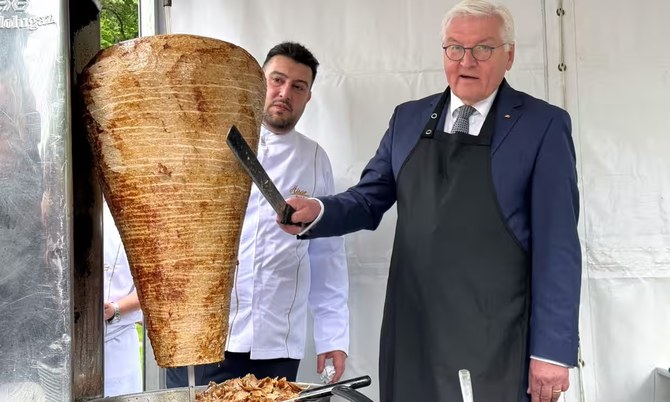
- German-Turkish say 60-kg kebab skewer brought from Germany in diplomatic mission reduces community’s contributions to stereotypical image
LONDON: German President Frank-Walter Steinmeier’s visit to Turkiye this week has stirred controversy after he brought along a 60-kg kebab skewer as part of his diplomatic mission.
Starting his three-day tour in Istanbul instead of Ankara, Steinmeier served kebabs at a reception, viewing it as a symbol of cultural exchange between the two nations.
“It is these special and intense relationships that bridge distances, and also some differences, today,” he said.
However, rather than emphasizing the close personal ties between Germans and Turks, the gesture drew criticism from many in the diaspora who viewed it as reducing their community’s contributions to a stereotypical image.
Germany, home to 2.7 million people of Turkish descent, welcomed hundreds of thousands of workers in the 1960s as part of its “guest worker” program, a bilateral agreement with Ankara to address labor shortages.
Turkish-Germans took to social media to condemn what they saw as a clumsy attempt to represent their community, accusing Steinmeier of failing to take them seriously or treat them as equals.
“Turkish-Germans discovered the 1st COVID vaccine in the world; some were movie directors who won awards on behalf of Germany, numerous writers, musicians, intellectuals from Turkey call Germany home,” wrote Evren Celik Wiltse, a professor of political science, on X.
“Of all of these, the (German) president chose the kebab maker to accompany him to (Turkiye)”, she added.
Turkish-Germans discovered the 1st COVID vaccine in the world; some were movie directors who won awards on behalf of Germany, numerous writers, musicians, intellectuals from Turkey call Germany home.
— Evren Celik Wiltse (@EvrenWiltse) April 22, 2024
Of all these, the president chose the kebab maker to accompany him to https://t.co/ZVMHyi48P0
Berkay Mandıracı, a senior analyst of Turkish-German heritage at the non-governmental organization Crisis Group, acknowledged that the gesture was well-intentioned but felt it was “anachronistic and reductionist.”
A well-intended gesture, I'm sure, but somehow not belonging to this age. As someone born and raised (until I was 12) in Germany, this feels anachronistic and reductionist.
— Berkay Mandıracı (@BerkayMANDIRACI) April 23, 2024
But let's not read too much into it and hope the rest of the visit will deepen Turkish-German ties https://t.co/ZjUvCLH7ES
The faux pas, which risked overshadowing the celebration of 100 years of diplomatic ties between the two nations, received the approval of Arif Keles, a third-generation kebab shop owner invited on the delegation trip by Steinmeier.
Keles, who served kebabs during the reception, described the opportunity as a “great honor.”
The dish of thinly sliced meat cooked on a vertical rotisserie was introduced to Germany by Turkish migrants.
Packed with chopped vegetables and doused with mayonnaise, the doner kebab has gained iconic status.
Local sales of the kebab total an estimated €7 billion ($7.5 billion), an immigrant success story the German presidency wanted to celebrate as an example of “how much Turkiye and Germany have grown together.”
Relations between Berlin and Ankara have been strained by various disputes, including disagreements over the Gaza conflict.
Steinmeier, visiting Turkiye for the first time since assuming office in 2017, has had a challenging relationship with Turkish President Recep Tayyip Erdogan, criticizing him for his approach to concerns about democratic norms in Turkiye.
Turkish-Germans have long spoken up about economic and social exclusion. Last year, Germany agreed to significantly ease citizenship rules to allow more dual nationals, a move welcomed by many Turkish individuals who have lived in Germany for decades.
With AFP
Controversy erupts as British MP Lee Anderson misses St. George’s Middle Eastern heritage
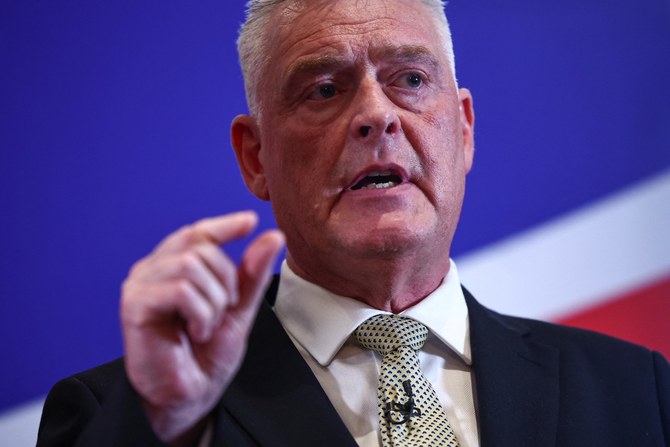
- The politician fails to acknowledge the patron saint of England’s connection to the Middle East in a video posted to celebrate St. George’s Day
LONDON: Reform UK MP Lee Anderson faced mockery after failing to acknowledge St. George’s historical ties to the Middle East in a recent social media post.
The former politician, who joined the far-right party after being suspended by the Conservatives for racist remarks about Mayor of London Sadiq Khan, shared a video on Tuesday commemorating St. George’s Day.
In it, Anderson proudly displayed red and white cufflinks matching the English flag. Also known as the St. George’s Cross, the symbol is historically associated with the Christian crusades.
“It’s St. George’s Day today and this country of ours has been a gift to the world,” Anderson said in the video.
In the accompanying caption, he wrote: “Trigger Warning. If you are a Guardian reading, advacado eating, Palestinian flag waving, Eddie Izzard supporting Vegan then this clip is probably not for your consumption.”
Anderson’s comments sparked amusement among users on X, where critics seized on his misspelling of “avocado” and highlighted the connection between Palestine and St. George, who is revered not only in England but also in parts of Africa, the Middle East, the Caucasus, and South America.
Comedian Shaparak Khorsandi quipped: “Who is going to tell him about St George’s connection to Palestine? (His mother was Palestinian, they too have a St. George’s day/feast. Though, to be fair, it is not known if he was related to Eddie Izzard),” referring to the actor/comedian.
Another user responded by sharing an image detailing facts about St. George, suggesting that if he were alive today, he would be considered an “immigrant” by Anderson’s standards, a group the Reform UK MP has repeatedly advocated should be deported.
Happy St George’s day. pic.twitter.com/Zq9cKGksOK
— GonePrivateIsh - still the same drivel (@Lairdysnr) April 23, 2024
Observed annually on the anniversary of St. George’s death with parades and marches, St. George’s Day was previously a national holiday and was once celebrated in England as widely as Christmas.
Born around AD 280 in what is now known as Cappadocia, Turkiye, St. George served as a soldier in the Roman army and fought in the crusade against Muslims. Beheaded in modern-day Palestine for refusing to renounce his Christian faith, St. George is revered by Christians, Druze and some Muslims as a martyr of monotheistic faith.
Renowned for his strength, courage and loyalty, St. George became a cherished figure in Europe and has been a symbol of English culture since the 14th century, despite never setting foot in the country.
Egypt reclaims 3,400-year-old stolen statue of King Ramses II

- Egyptian authorities spotted the artefact when it was offered for sale in an exhibition in London in 2013
CAIRO: Egypt welcomed home a 3,400-year-old statue depicting the head of King Ramses II after it was stolen and smuggled out of the country more than three decades ago, the country’s antiquities ministry said on Sunday.
The statue is now in the Egyptian Museum in Cairo but not on display. The artefact will be restored, the ministry said in a statement.
The statue was stolen from the Ramses II temple in the ancient city of Abydos in Southern Egypt more than three decades ago. The exact date is not known, but Shaaban Abdel Gawad, who heads Egypt’s antiquities repatriation department, said the piece is estimated to have been stolen in the late 1980s or early 1990s.
Egyptian authorities spotted the artefact when it was offered for sale in an exhibition in London in 2013. It moved to several other countries before reaching Switzerland, according to the antiquities ministry.
“This head is part of a group of statues depicting King Ramses II seated alongside a number of Egyptian deities,” Abdel Gawad said.
Ramses II is one of ancient Egypt’s most powerful pharaohs. Also known as Ramses the Great, he was the third pharaoh of the Nineteenth Dynasty of Egypt and ruled from 1279 to 1213 B.C.
Egypt collaborated with Swiss authorities to establish its rightful ownership. Switzerland handed over the statue to the Egyptian embassy in Bern last year, but it was only recently that Egypt brought the artefact home.
A Nigerian chess champion is trying to break the world record for the longest chess marathon
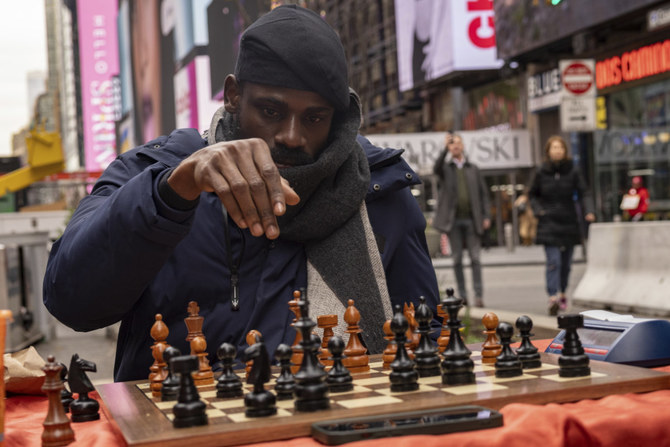
- Tunde Onakoya, 29, is playing against Shawn Martinez, an American chess champion, in line with Guinness World Record
- Onakoya, who founded Chess in Slums Africa, hopes to raise $1 million for children’s education across Africa
NEW YORK: A Nigerian chess champion and child education advocate is attempting to play chess nonstop for 58 hours in New York City’s Times Square to break the global record for the longest chess marathon.
Tunde Onakoya, 29, hopes to raise $1 million for children’s education across Africa. He is playing against Shawn Martinez, an American chess champion, in line with Guinness World Record guidelines that any attempt to break the record must be made by two players who would play continuously for the entire duration.
Onakoya had played chess for 42 hours by 10:00 a.m. GMT on Friday. Support is growing online and at the scene, where a blend of African music is keeping onlookers and supporters entertained amid cheers and applause.
The current chess marathon record is 56 hours, 9 minutes and 37 seconds, achieved in 2018 by Hallvard Haug Flatebø and Sjur Ferkingstad, both from Norway.
The record attempt is “for the dreams of millions of children across Africa without access to education,” said Onakoya, who founded Chess in Slums Africa in 2018. The organization wants to support education of at least 1 million children in slums across the continent.
“My energy is at 100 percent right now because my people are here supporting me with music,” Onakoya said Thursday evening after the players crossed the 24-hour mark.
On Onakoya’s menu: Lots of water and jollof rice, one of West Africa’s best known dishes.
For every hour of game played, Onakoya and his opponent get only five minutes’ break. The breaks are sometimes grouped together, and Onakoya uses them to catch up with Nigerians and New Yorkers cheering him on. He even joins in with their dancing sometimes.
A total of $22,000 was raised within the first 20 hours of the attempt, said Taiwo Adeyemi, Onakoya’s manager.
“The support has been overwhelming from Nigerians in the US, global leaders, celebrities and hundreds of passersby,” he said.
Onakoya’s attempt is closely followed in Nigeria where he regularly organizes chess competitions for young people living on the streets to boost his cause. More than 10 million children are out of school in the West African country — one of the world’s highest rates.
Among those who have publicly supported him are celebrities and public office holders, including Nigeria’s former Vice President Yemi Osinbajo, who wrote to Onakoya on X, formerly Twitter: “Remember your own powerful words: ‘It is possible to do great things from a small place.’“
The Guinness World Record organization has yet to publicly comment about Onakoya’s attempt, which could reach 58 hours by midnight on Friday. It sometimes takes weeks for the organization to confirm any new record.




